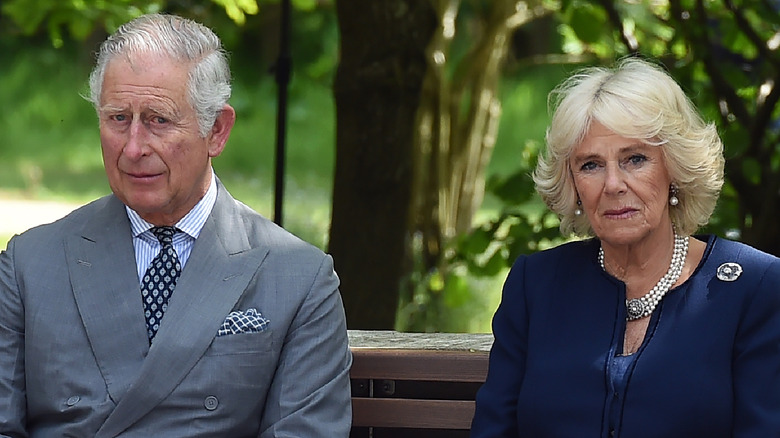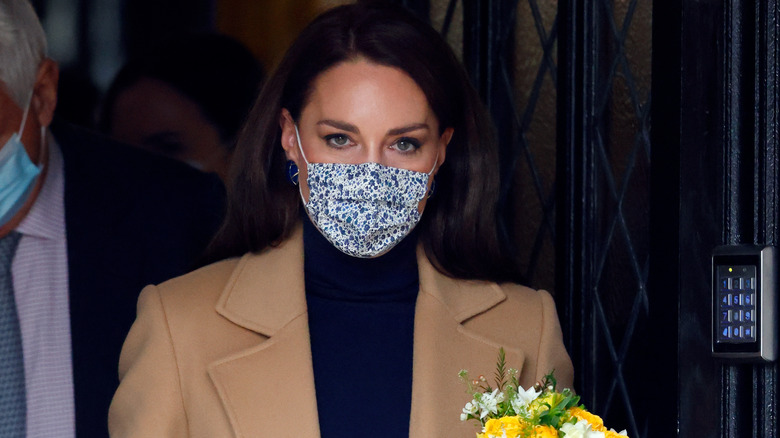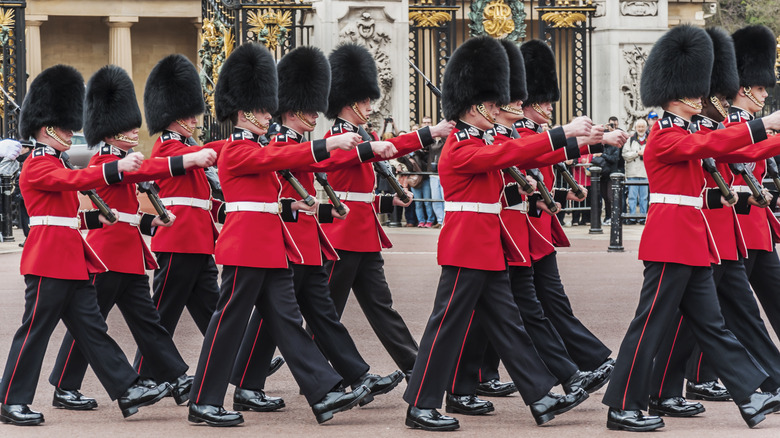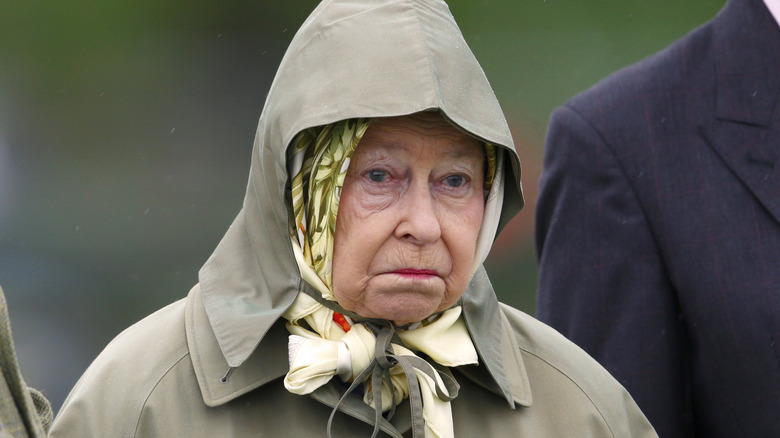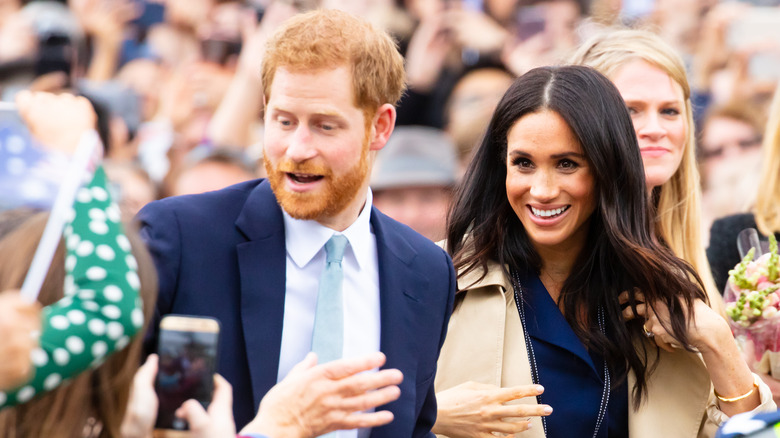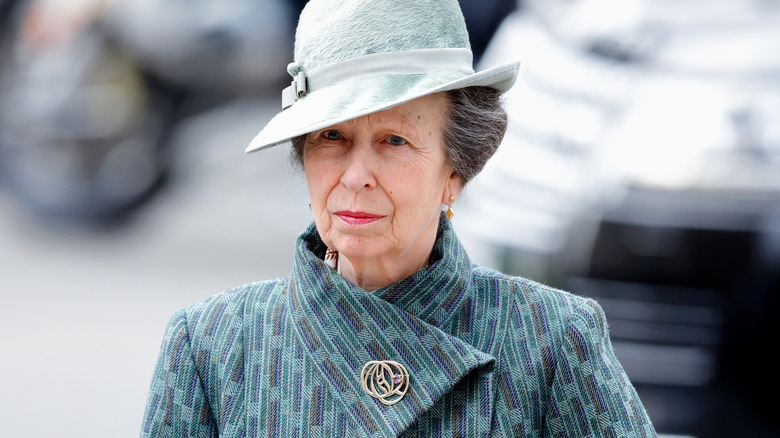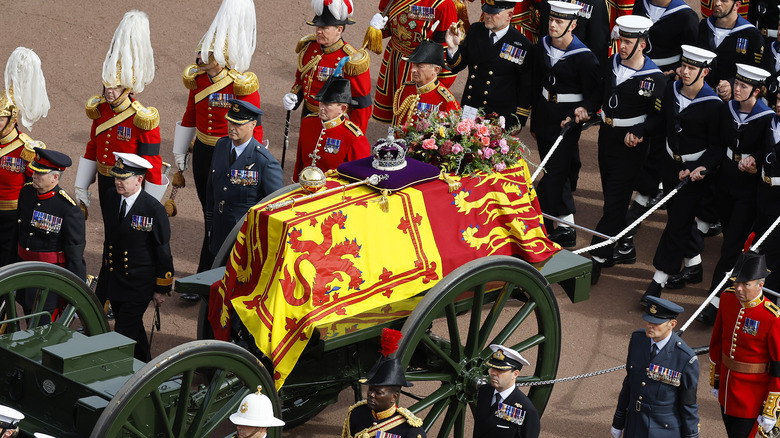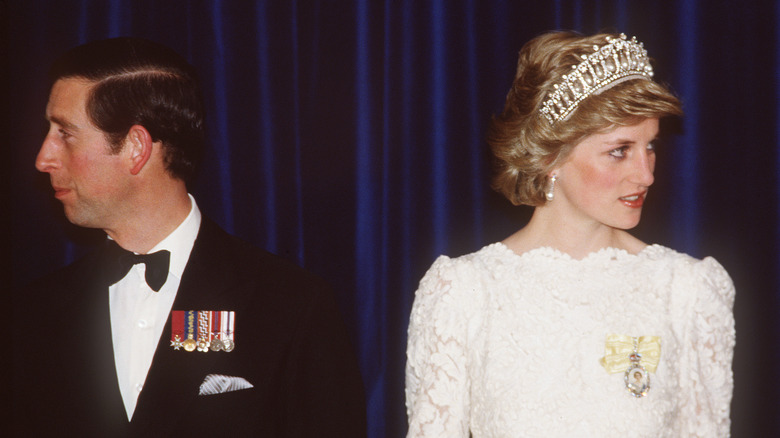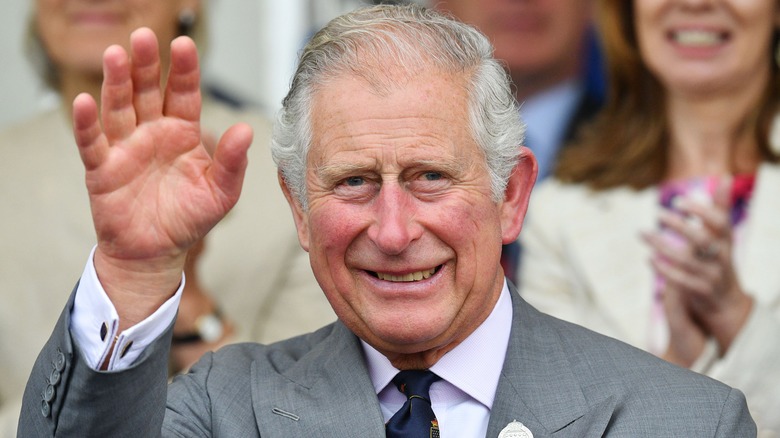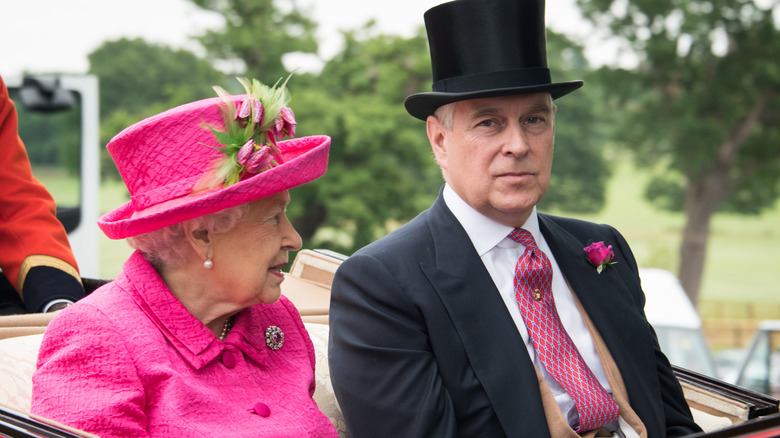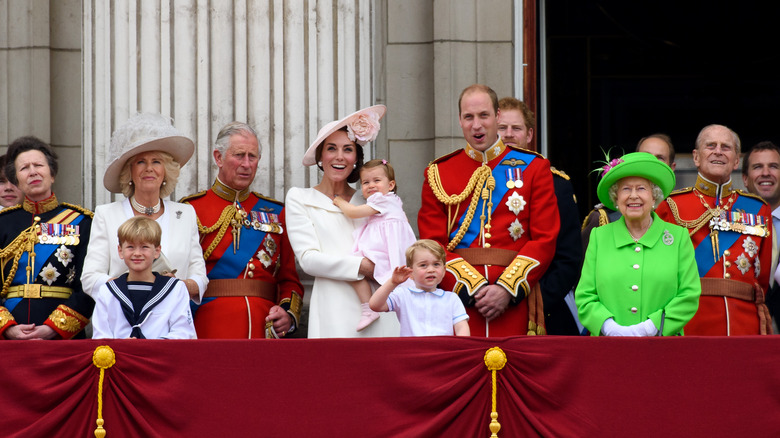Signs The Royal Family Is Losing Money
It's true that the British royal family has amassed an incredible fortune most commoners will never see in their lifetime. They have been one of the most influential families in the world for countless years, having reigned for 37 generations and over 1,000 years.
So, how does the royal family actually earn money? Well, it takes a lot of money for the entirety of the royal family to operate, including their staff, and this comes from the Sovereign Grant, which is paid for by the U.K. government and taxpayers, the royals' portfolio of land, called the Duchy of Lancaster, as well as their personal assets. Money is invested into the royal family because they actually have a monumental impact on the U.K.'s economy, mostly through tourism, but also via media. As King George VI put it, they are "not a family, we're a firm." Meaning no matter who is the reigning monarch at the time, the royal family (or firm) requires an abundance of hands and funds to keep the gears moving.
In 2021, Forbes estimated that the royal family is worth a whopping $28 billion. However, despite their hefty estimated net worth, there are plenty of reasons to think that the British monarchy won't always be as flush with cash as it is now. Here are some of the signs the royal family is losing money.
The pandemic stunted their income
Most businesses suffered during the pandemic, but the royal family's losses were unparalleled. Estimations varied, but CNBC reported that about £35 million of their income was lost due to a lack of visitors to their estates. The royal family still received the Sovereign Grant payments, funded by taxpayers, but this money is based on 15% of the estates' revenue. With the decreased revenue, there's a chance that their Sovereign Grant income may fall someday in the future, too.
When Buckingham Palace and Windsor Castle were no longer bringing in tourists' money, there was a dramatic dip in the royal family's income. On top of this, Queen Elizabeth II was forced to cancel all of her normal functions that would normally draw in visitors worldwide, as she was deemed at high risk. Refunds were issued for ticket holders who had paid ahead of time to visit the Buckingham Palace State Rooms, which would have been another blow to their already sensitive situation.
In May 2020, a Buckingham Palace representative told Newsweek, "The whole country is very likely to be impacted financially by coronavirus and the royal household is no exception. However, the time to address this issue will be when the full impact of all the implications of the current situation is clearer." At least there were no layoffs at Buckingham Palace, but losses were covered by "efficiency savings," according to CNBC.
Tourism in the U.K. has gone down
Millions of tourists flock to England annually to see the attractions, with several also paying for tickets to see the inside of Windsor Castle and Buckingham Palace. The draw of the royals has boosted tourism sales for decades, which generates millions of pounds for the U.K. as well as lines their pockets handsomely.
However, since the pandemic, tourism numbers have yet to reach the heights they once were. COVID-19 put a halt to any income the royal family could have made through visits to their estates, but since everything opened back up again, you'd think that tourists would be eager to hop back across the pond to see the sights. According to the Association of Leading Visitor Attractions, there was a 69% rise in tourist attraction visits in 2022, but this increase is compared to numbers recorded when traveling was practically obsolete. This rise in tourism is still 23% less than it was in 2019, so it can't just be the pandemic to blame.
Bernard Donoghue, the association's director, told The Guardian, "We as a sector have never been hit by so many variables, which are completely out of our control, all at the same time. Not just COVID, but also the cost of living crisis, energy costs, and the hangover of Brexit." So not only has the royal family suffered a loss of revenue from the pandemic, but this may be a lasting issue given the current state of the U.K.'s economy.
COVID-19 forced the closure of their palaces
In 2019, tourism in the form of tickets and souvenirs brought in £70 million for the royal family. The main attractions tourists want to see are the Crown Estates, which include an array of impressive landmarks like Buckingham Palace, Windsor Castle, and the Royal Mews. So when these properties were forcibly shut down due to COVID-19, the royal family lost out on a heap of money.
Lord Chamberlain Earl Peel wrote an email to the royal staff that The Sun obtained. In it, he said, "The royal household, like most organizations, is not immune to the impact of the pandemic on our financial position. Many projects have been halted and all but essential expenditure has been suspended."
Such projects included the planned renovations on Buckingham Palace, so it was quite telling that their financial concerns were at an all-time high. The royal family typically spends millions of pounds on the upkeep of their estates, seeing as how their properties are the biggest cash cows in their portfolio. However, with the palaces closed and without proper upkeep, the royals likely have had to fork out an inordinate price once they did open back up to the public, given the months of inoperation after already feeling the substantial loss of income.
The public's waning endorsement of the royal family
The royal family is like pineapple on pizza — you either hate them or you love them. And much of the United Kingdom endorses the royal family, but there's some speculation that this could change someday soon.
England is struggling economically right now, with the cost of living soaring and household income dipping. So, given that U.K. taxpayers are already supporting the royals through the Sovereign Grant, not everyone is on board with the new £27.3 million subsidy proposed in 2022, bringing the Sovereign Grant to £86.3 million. This increased amount came from the loss of revenue the royal family saw during COVID-19, and this in itself doesn't set the best precedent for struggling U.K. families. However, in an incredibly tone-deaf twist, the royal family's spending has actually increased by an incredible 53% in the last four years.
Back in 1983, the first British Social Attitudes survey was conducted to determine how important the U.K. deems the monarchy, with the majority leaning in favor of the royals. Over the years, answers have fluctuated, as would be expected, but recently support has faltered, mostly among young Brits. If the U.K. were to theoretically abolish the monarchy in favor of a republic in the future, royal commentator Marlene Koenig told Insider, "The royal family would still be able to survive — whether from private property or corporate deals — if the monarchy no longer existed." However, they would be millions upon millions out of pocket.
Lavish expenses of the royal family
The members of the royal family are each worth at least a small fortune, with more prominent figures boasting six digits. As rich as they may be, their only true wealth comes from their personal assets and estates. All royal art and crown jewels are official royal residences and are passed down within the scope of successors. But there are some members of the royal family who splash out as if the public isn't funding some of their lavish expenses.
In 2022, Bloomberg summarized the bill racked up by the British monarchy between 2020 and 2021, with their overall expenses coming to approximately £102.4 million (a 17% rise from the year before). The majority goes towards property maintenance, while the rest of the Sovereign Grant is dedicated towards payroll and the royals' travels. That's why it was a slap in the face when Prince Andrew booked a private jet for nearly £16,000 in 2019. It was argued that he could have booked a commercial flight for less than £100, but a source told Express, "In this particular case, we concluded that actually, the use of charter was the only way to get him to complete his engagements to fit in with his other programs."
This was far from the first time a big chunk of taxpayer change was carelessly spent, as Princess Anne spent £16,440 on a private jet to Italy to attend a rugby game in 2020.
The queen's death cost a fortune
When Queen Elizabeth II died in 2022, she left behind a sizable net worth, which was primarily inherited by King Charles III. While the U.K. mourned her loss for 10 days, something that wasn't on many people's minds at the time was the financial impact her funeral would have.
Simon Morgan, a former royal security officer, spoke with the New York Post about what he predicted would be the most expensive U.K. royal event so far, totaling $7.5 million. Morgan said, "This is the biggest policing operation that United Kingdom policing has ever undertaken. When you look at the other events, they were big — the Prince and Princess of Wales' wedding in 2011 was the biggest — but in comparison to this, you can't compare it."
World leaders from around the globe were in attendance, so extra security was needed for the somber event. Roads were closed, a bank holiday was announced, and London was more or less shut down for the event. So aside from the upfront costs for security and travel, the U.K. economy would have been put on pause as well.
Divorces in the family have eaten away at their budget
The British monarchy is still a little old-fashioned in some ways, having only allowed royal divorcées to remarry in 2002 and maintaining several rules royals have to follow when getting divorced. As much as spectators love a royal wedding, a royal divorce can be just as juicy, providing gossip columns and talk shows plenty to discuss.
However, these unfortunate dissolutions of marriage have been a pain in the side of the royal family, because like many divorces, they're not cheap. David McClure, a royal finance expert, sat down with Express to discuss the impact they've had on the royals. "In one year in 1992, the marriages of three of her children really collapsed. The queen had to pay, in part, for the cost of the divorce of Prince Andrew and Sarah Ferguson's marriage. Initially, when Prince Charles divorced from Princess Diana I don't think Charles had enough money to pay for the divorce settlement. That cost came to about £70 million and by all accounts, he had to borrow some money from the queen to finance that quite hefty bill."
The number of royal divorces has risen over the years, from Princess Anne and Mark Phillips to Prince Andrew and Sarah Ferguson, as well as Peter Phillips and Autumn Kelly. And although many probably don't require the financial input of the reigning monarch, these settlements could eat away at the royal family's wealth.
King Charles III's coronation was meant to be cost-effective
In September 2022, news broke that King Charles III would have a cost-effective coronation in light of the cost of living crisis plaguing England. The Telegraph revealed that the plans for his coronation reflected that the event would be cheaper, run for less time than Queen Elizabeth II's coronation, and that King Charles III hoped his service would be deemed "good value." This all sounded great, considering the government would be footing the bill.
Flash forward to March 2023, and all of these cheaper, cost-effective plans have gone out the window. The guest list will remain small and the length of the coronation is meant to be shorter still, but it's been reported that it will cost a stupendous £100 million. For reference, Queen Elizabeth II's coronation in 1953 cost £1.5 million. A source told The Sun, "In today's money the 1953 coronation cost around £50 million but estimates for King Charles' are twice that because of things like security, which weren't such a big issue back then. But ... it will be a massive boost to tourism. Hotels are already being booked out for the coronation weekend."
Chancellor of the Duchy of Lancaster, Oliver Dowden, told The Mirror that the coronation plans are intended to be "mindful of ensuring that there is value for the taxpayer." As it would seem, the king will have an extravagant coronation, as long as it's not his money at stake.
The queen helped pay Prince Andrew's settlement
Prince Andrew is now considered disgraced, as he stepped away from his royal duties back in 2019 following a whirlwind of controversy. After his ties to sex offender Jeffrey Epstein surfaced, and they were photographed together following Epstein's jail time in 2010, an accusation of sexual abuse was made against Prince Andrew. He sat down with the BBC for an interview, which just got him in more trouble after he tried to deny the allegations.
Ultimately, Prince Andrew paid a settlement of £12 million, which came from Queen Elizabeth II's own purse. The queen had already been funding her son's legal battle, which would have had to come out of her own personal finances. But, with the threat of overshadowing her Platinum Jubilee year, it was believed that the queen wanted this ordeal over and done with. Shortly thereafter, she stripped Prince Andrew of his military titles and patronages.
A source spoke to The Telegraph about Prince Andrew's refraining from public events, saying, "It has been made clear that the public have heard enough about him and enough from him. They need to hear no more." And no wonder, because as it stands, the royal family has enough financial concerns without the help of another loose canon.
They're notoriously private about their expenditures
The royal family are notoriously private about several aspects of their lives, picking and choosing when to let a "secret" out for the public. This is especially true when it comes to their expenditures. In 2023, The Guardian launched an investigative series titled "Cost of the crown," in which they delved into the secrecy around the royal family's finances.
For example, it took a decade of research and a visit to court to secure King Charles III's memos, which reveal his attempts to lobby government officials. The government spent £400,000 to try to keep these memos quiet. As reporters continue to probe the family's wealth, Buckingham Palace has said the royals' spending should "remain private, as they would for any other individual." This is questionable, seeing as how the public is behind the royal family's funds.
In speaking with Express, royal expert Daniela Elser said, "The queen and the royal family to this day receive special treatment from the U.K. government when it comes to things like taxes and their wills, all the while they are allowed to conceal the true extent of their personal riches. For more than a century Britons have swallowed the near total blackout when it comes to the Windsors and their stuffed wallets, but for how much longer?" It would seem the monarchy would be more forthcoming about their finances, at least out of good faith, if they didn't have anything to hide.
